By Dr. Kristi Drexler
Faculty Member, School of STEM
with Pedro Maldonado
Doctoral Student, School of Security and Global Studies
In March, our team – consisting of Dr. Michelle Watts, Dr. Kristi Drexler, Dr. Casey Skvorc and AMU doctoral student Pedro Maldonado – presented our COVID-19 research at the Southeastern Council of Latin American Studies (SECOLAS) conference in Antigua Guatemala. As a non-government and non-profit organization, SECOLAS promotes “interest in Latin America, scholarly research pertaining to Latin America in all fields, and the increase of friendly contacts among the peoples of the Americas.”
Lovely Antigua Guatemala
Antigua Guatemala (meaning “Old Guatemala”) is a city in the central highlands of Guatemala. It is located about 25 miles southwest of Guatemala City, the country’s capital.
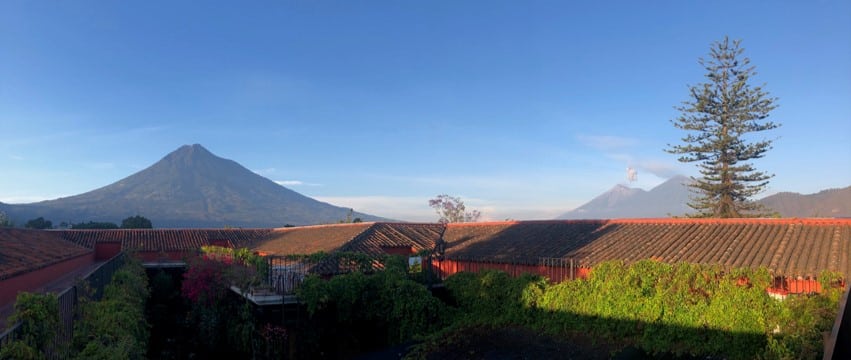
Antigua Guatemala is a UNESCO World Heritage Site. According to World Bank, Antigua Guatemala was founded in 1524 under the name of “Santiago de los Caballeros de Guatemala” and served as the country’s first capital.
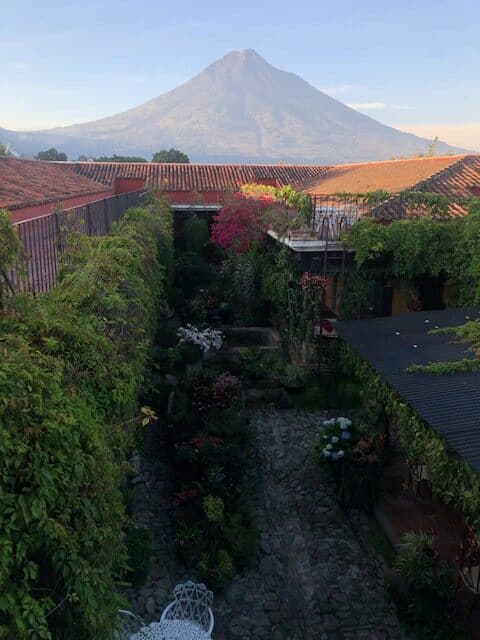
Antigua Guatemala is known for its well-preserved colonial architecture, colorful buildings, cobblestone streets, and numerous churches and convents. According to Britannica, Antigua Guatemala is known primarily for the “ruins and colonial edifices that make it a museum of Spanish colonial history” where you can find a central plaza and principal buildings still in use.
Antigua Guatemala is a truly beautiful city with stunning architecture and a rich cultural heritage. According to Michelle, “We were lucky enough to be able to witness some of the leadup to Semana Santa. Religious processions have been taking place weekly and will increase and intensify as Easter approaches.”
Michelle adds, “In Antigua Guatemala, people rise early in the morning to create beautiful carpets made from items such as flowers and fruits for the processions to walk on. People come from all over the world to review these processions in Antigua Guatemala, and the expectation for attendance is at an all-time high after several years of vastly reduced observances during the pandemic.
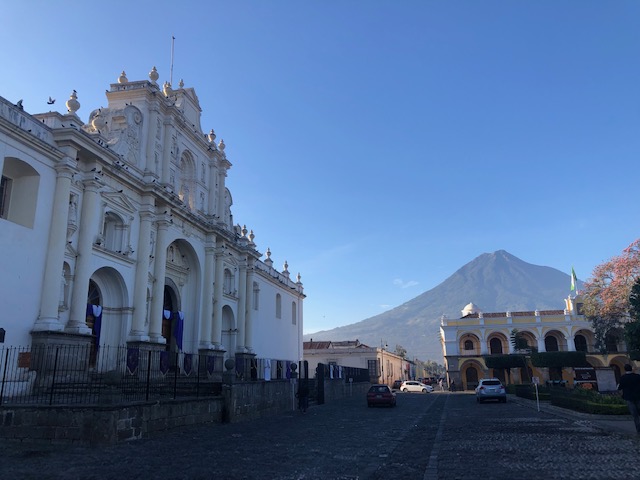
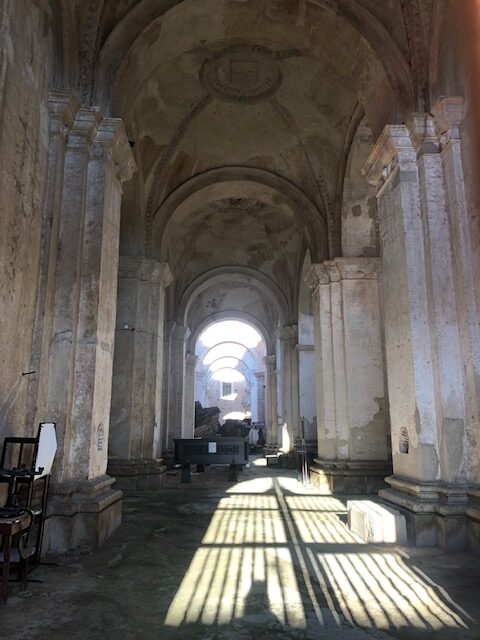
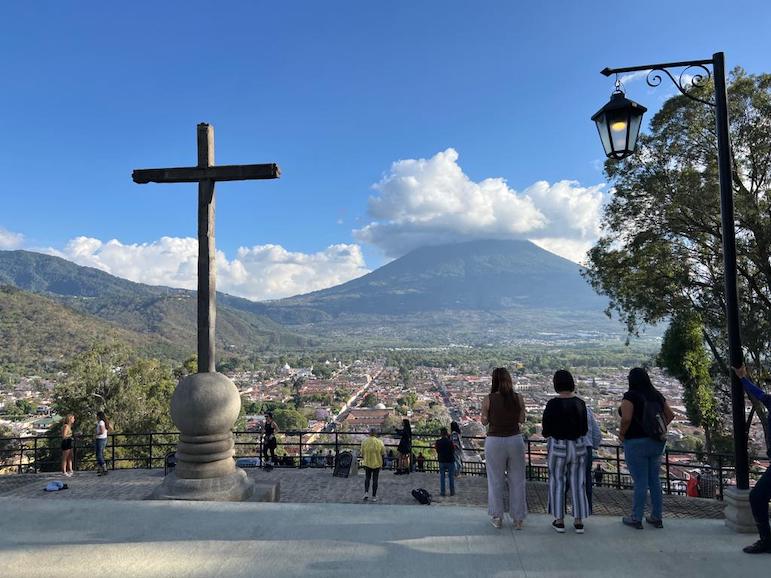
Also, Guatemalan Coffees notes that “Rich volcanic soil, low humidity, lots of sun, and cool nights characterize the Antigua Coffee region. This valley is surrounded by three volcanoes: Agua, Fuego, and Acatenango.”
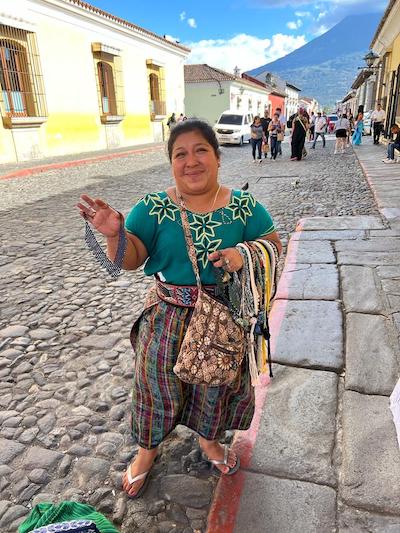
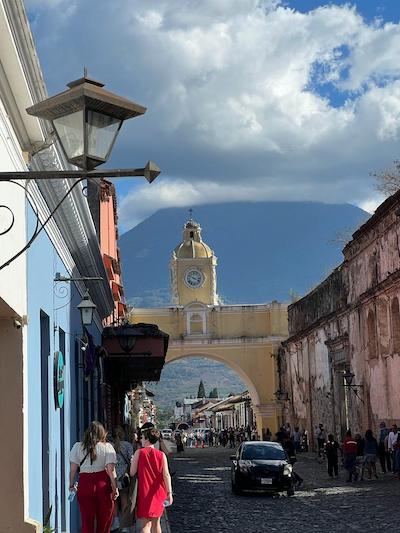
Conducting the COVID-19 Research for Our SECOLAS Presentation
In March, our team (Kristi, Michelle, and Casey) concluded our 2023 field research in Central America with visits to communities in both Belize and Guatemala. In mid-March, we interviewed residents of San Antonio Village, Belize. After that, we went to two communities, San Jorge and Panajachel, at Lago Atitlan in the highlands of Guatemala.
Our University-supported study, “A Case Study Comparison of Pandemic Experiences of Indigenous Groups in the Americas” examines the variety of COVID-19 impacts to Indigenous communities. According to Michelle, the primary investigator for this study, our research “gives voice to the lived experiences of Indigenous communities and how they have managed a global pandemic in their respective communities.”
Many of the residents we interviewed for this study are leaders and innovators in their community who were able to problem-solve COVID-19-related issues in real time, using their limited resources to protect their communities. The study uses the Community Capitals Framework – an area used in Kristi Drexler’s previous studies – to examine interview responses and assess community perceptions of:
- Health
- Cultural practices
- Livelihoods
- The environment
- Governance
- Education
By examining these areas, we determined how those areas connect to civil society, collective action, socio-ecological system changes and resilience during the COVID-19 pandemic.
The 2023 field research was a continuation of the 2022 study where our team conducted resident interviews in the Metlakatla Indian Community in southeast Alaska and in Taos Pueblo in northern New Mexico. Graduate student Bridget Kimsey assisted the Taos field research in April and October last year.
Similarly, undergraduate student Tara Shultz assisted the Metlakatla field research in August last year. Doctoral student Anthony Caole led the Perryville, Alaska research in July. All three will be contributing to future scholarly publications on this study.
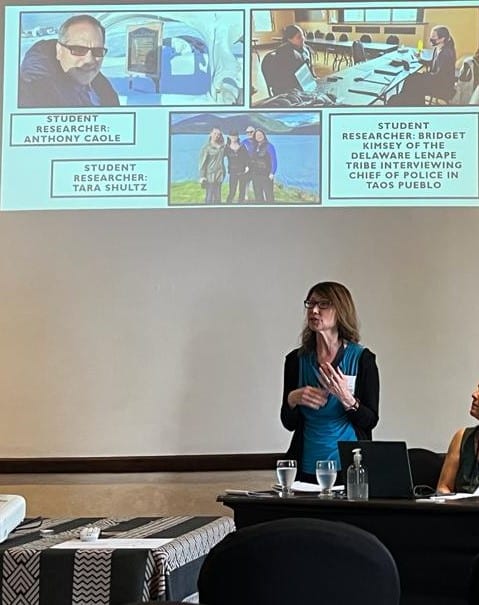
The University’s New SACNAS-APUS Chapter
The Society for Advancement of Chicanos/Hispanics & Native Americans in Science (SACNAS) has a new student chapter at the University called “SACNAS-APUS.” SACNAS-APUS promotes diversity in STEM in the contexts of social connections and sense of belonging, academic development, and professional development.
SACNAS-APUS is a brand-new student organization at the University; Bridget Kimsey of the Delaware Lenape Tribe serves as the President and Pedro Maldonado is the Vice President. The faculty advisors are myself (Kristi), Michelle Watts, Shelli Carter and Jim Burch. Michelle, Kristi, Pedro (and supporter of SACNAS, Casey) posted a SACNAS-APUS field trip video on Facebook from El Tenedor overlooking Antigua.
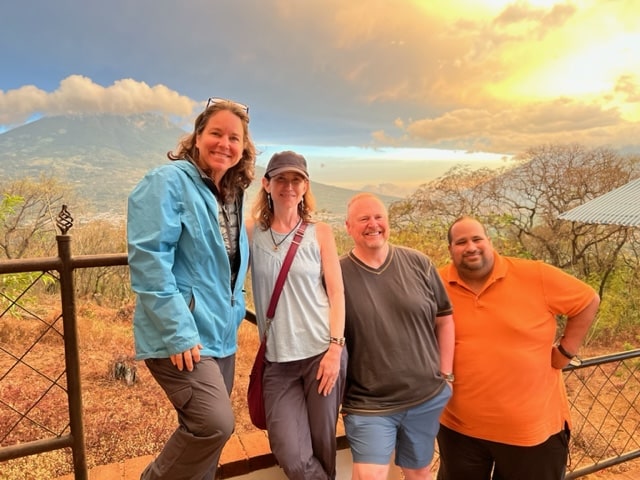
As the Vice President of SACNAS-APUS, Pedro says that “SACNAS works to achieve its mission by providing mentorship, professional development and leadership opportunities to its members. It would behoove SACNAS members to attend the SECOLAS conference. It would allow an opportunity to connect with other Chicanos, Hispanics and Native Americans.”
Michelle adds: “It’s exciting to be a part of this great new student club, and it was especially gratifying to be able to present at the SECOLAS conference with my Kristin and Casey. We were also fortunate to be able to attend Pedro’s presentation on the psychology of Fidel Castro. Pedro was very well prepared and had an excellent presentation.”
Reflecting on Our SECOLAS Conference Experience
As a part of the travel experience, we spent time to reflecting on our SECOLAS presentation experience in Antigua, Guatemala.
Kristi: Pedro, you’re a Ph.D. student at the University’s School of Security and Global Studies – we’re SO glad to see you presenting at SECOLAS! Tell us about the 2023 SECOLAS conference. What was your presentation and how did it go?
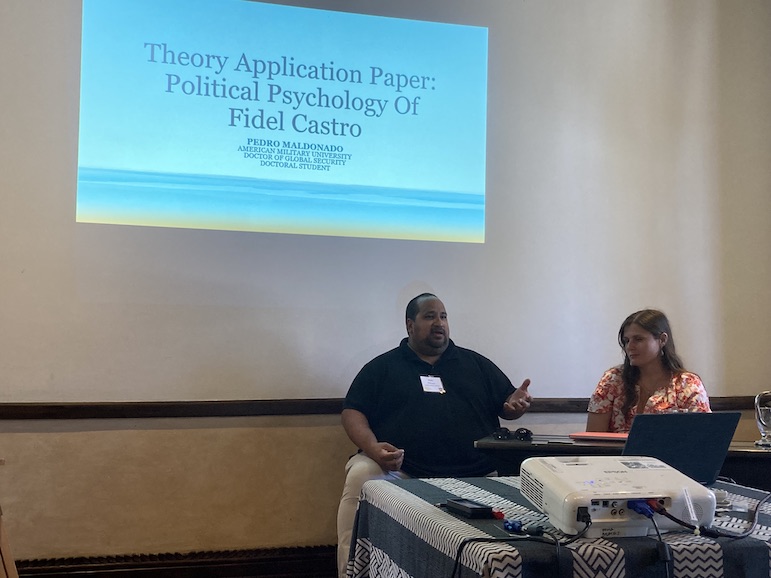
Pedro: My presentation was in group #44 on the agenda titled “Political Psychology of Fidel Castro.” It went wonderfully.
It was a great experience to present at my first conference, especially with the University’s faculty present. SECOLAS was a great networking experience; I connected with professors and doctoral candidates/students in the Latin American field.
Kristin: Casey, how did the conference go for you?
Casey: The experience was outstanding. A highlight of the conference was the opportunity to mentor and prepare one of my advisees, Pedro Maldonado, with his first doctoral-level conference presentation. This work was especially rewarding because Pedro’s presentation, “The Political Psychology of Fidel Castro,” was his research topic for our DOCT 711 Psychology of Global Political Actors course.
I’m very pleased to report that Pedro’s presentation was, hands-down, the best of those presented by his panel. His delivery, slide deck and responsiveness to audience questions were all top-drawer.
I think all of my professorial colleagues will agree – it is moments like these that are the most rewarding. Bravo, Pedro! Looking forward to hearing about your next conference presentation success.
A further high point of the SECOLAS Conference was the opportunity to present on a panel with my two colleagues to report on progress of our faculty grant research in Metlakatla, Alaska, and Taos Pueblo, New Mexico, as well as Belize and Guatemala. The topic of our presentation, “An Interdisciplinary Assessment of COVID-19 Pandemic Impacts on Indigenous Communities of the Americas (from Alaska to Belize),” gave each of us the opportunity to showcase our individual subject focus area of our joint research project.
My presentation focused on “COVID-19-Related High Court Decisions Protecting Indigenous Communities in the Americas.” I had the opportunity to provide detailed case analyses of key legal decisions issued by the Supreme Courts (or equivalent) of Brazil, Canada, Ecuador, and the United States.
Comparing and contrasting the impacts of each of these decisions provided an important element of our “community capitals” focus of our joint presentations. This was the first “legal-related” focused presentation I’ve provided in a couple of years, and it was great to be up to bat again at the conference level.
Kristi: What insights did all of you gain from participating in the SECOLAS conference?
Pedro: SECOLAS is one of the best ways to connect with experts in the Latin American community. There is also an opportunity to present and meet with other SACNAS members.
Participating in an academic conference was an enormous benefit. SECOLAS provided an opportunity for me to meet and connect with other scholars and researchers in their fields. I hope these new connections can lead to new collaborations, partnerships and research opportunities.
The conference also offered a platform for other scholars to present their research to a broader audience. For instance, SECOLAS allowed us to receive feedback on our work, refine our ideas and share our findings with others. Participating in academic conferences is a valuable investment for scholars, researchers, and students looking to grow their professional knowledge, improve their research, and stay connected to the broader academic community.
Michelle: I feel like I learn so much from every conference I go to. First, there is much to learn from each presentation as academics delve into their research.
Second, it is always instructive to see different presentation styles as well as the many ways that technology can enhance presentations, such as video clips of a progressive Brazilian singer. There are also technological failures that remind us that we can never count on having our slides to help us through a presentation!
Casey: Working with this COVID-19 research team provided a valuable opportunity to collaborate with others share perspectives and make plans for future work. As the saying goes: “Priceless.”
The opportunity to do COVID-19 research in Antigua Guatemala is one I’m particularly grateful for. Having traveled to all of the populated continents, I can easily say that Antigua Guatemala had some of the warmest and kindest people I’ve come across in an idyllic setting.
I’m enthusiastic about the next phase of our research progress, which will be publishing our findings to date. Thanks to all who made the SECOLAS conference a major success!
About the Authors
Dr. Kristin Drexler is a full-time faculty member in the Space Studies and Earth Sciences Department. She teaches geography, environmental science, earth system history, conservation of natural resources, and earth and planetary sustainability for the School of STEM. She earned her Ph.D. in educational leadership at New Mexico State University by researching socioecological systems, sustainable agroecology and community education.
Dr. Drexler earned her Master of Arts in international affairs with an emphasis in natural resources management from Ohio University. She earned the Undergraduate Excellence in Teaching Award for the School of STEM (2020) and the Dr. Wallace E. Boston Leadership Award (2021). Dr. Drexler has conducted numerous community surveys in Belize regarding agroforestry, conservation and sustainable agriculture. Dr. Drexler serves as a faculty advisor for the University’s wSTEM and AWIS chapters. She is a co-investigator for the research study, “A Case Study Comparison of Pandemic Experience of Indigenous Groups in the Americas.”
Pedro Maldonado is a Doctor of Global Security student at American Military University. He earned his master of arts in international administration from the University of Miami (Coral Gables). Pedro has over 20 years of experience in the federal government and has lived in Washington, DC, for the last 10 years.

Comments are closed.